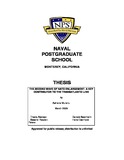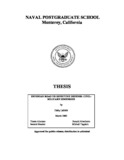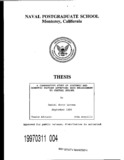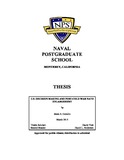The second wave of NATO enlargement: a key contributor to the transatlantic link?
| dc.contributor.advisor | Abenheim, Donald | |
| dc.contributor.author | Murariu, Adriana | |
| dc.date | March 2005 | |
| dc.date.accessioned | 2012-03-14T17:34:33Z | |
| dc.date.available | 2012-03-14T17:34:33Z | |
| dc.date.issued | 2005-03 | |
| dc.identifier.uri | https://hdl.handle.net/10945/2230 | |
| dc.description.abstract | The purpose of this study is to determine how post-Cold War NATO allies have contributed to transatlantic relations, both in times of crisis and in times of harmony. Their contribution, although less significant when compared to long-time members' military capabilities, takes various forms. Their support in times of disagreement among allies over the Iraq 2002-2003 issue proved to be more valuable than was anticipated. Therefore, my research is an introspective look at the events that marked NATO's evolution during the last fifteen years and their implications for NATO members as units and for traditional transatlantic relations as a whole. Successive NATO enlargements proved that each decision to add new members reflected NATO's priorities at that particular moment. Whether it was a pre-Cold War enlargement or a post-Cold War enlargement, the decision reflected NATO's interests. Some of the decisions were predominantly military; some were in accordance with the international order established after World War II. The post-Cold War enhancements had two major characteristics: the first enlargement was more symbolic than the second because it erased the artificial lines set by Yalta, whereas the second one was much more practical. The geo-strategic position of the NATO candidates and their willingness to join, prior to their formal invitation, were favorable factors, and the decisions made regarding membership proved to have long-term, positive consequences. New NATO members, particularly Romania, appreciated their new status and participated actively in both NATO operations and in "coalition of the willing". Their equal participation in NATO-led operations and coalitions made a palpable contribution to both NATO and to the transatlantic relations. | en_US |
| dc.description.uri | http://archive.org/details/thesecondwaveofn109452230 | |
| dc.format.extent | xiv, 79 p. : col. map | en_US |
| dc.publisher | Monterey California. Naval Postgraduate School | en_US |
| dc.rights | Copyright is reserved by the copyright owner | en_US |
| dc.subject.lcsh | Civil-military relations | en_US |
| dc.title | The second wave of NATO enlargement: a key contributor to the transatlantic link? | en_US |
| dc.type | Thesis | en_US |
| dc.contributor.secondreader | Peters, Hans-Eberhard | |
| dc.contributor.corporate | Naval Postgraduate School (U.S.) | |
| dc.contributor.department | Department of National Security Affairs | |
| dc.subject.author | NATO enlargement | en_US |
| dc.subject.author | Romania | en_US |
| dc.subject.author | Transatlantic relations | en_US |
| dc.description.service | International Civilian, Romanian Ministry of National Defense | en_US |
| etd.thesisdegree.name | M.A. in Security Studies (Civil-Military Relations) | en_US |
| etd.thesisdegree.level | Masters | en_US |
| etd.thesisdegree.discipline | Security Studies | en_US |
| etd.thesisdegree.grantor | Naval Postgraduate School | en_US |
| etd.verified | no | en_US |
| dc.description.distributionstatement | Approved for public release; distribution is unlimited. |
Files in this item
This item appears in the following Collection(s)
-
1. Thesis and Dissertation Collection, all items
Publicly releasable NPS Theses, Dissertations, MBA Professional Reports, Joint Applied Projects, Systems Engineering Project Reports and other NPS degree-earning written works.





